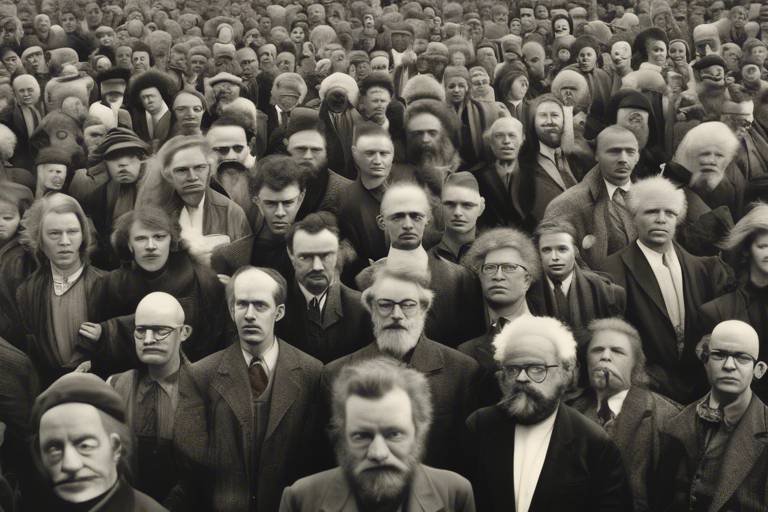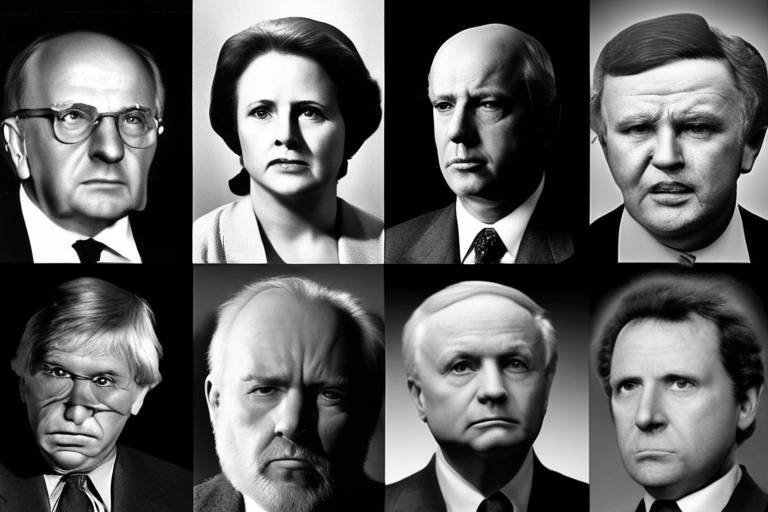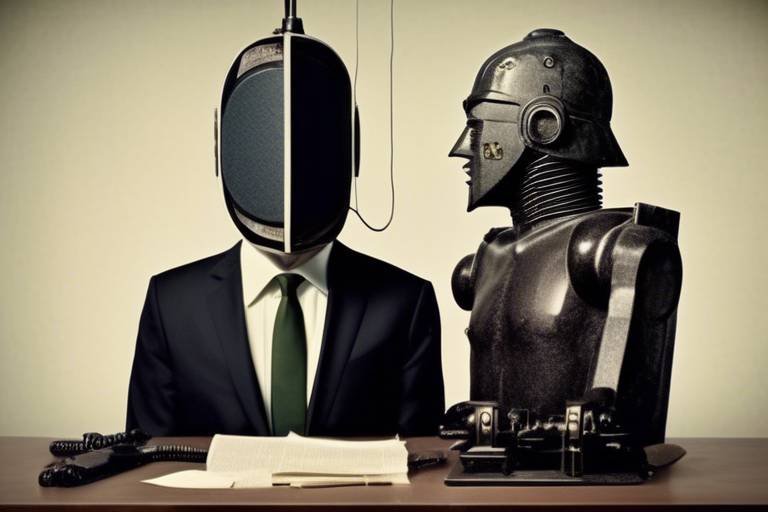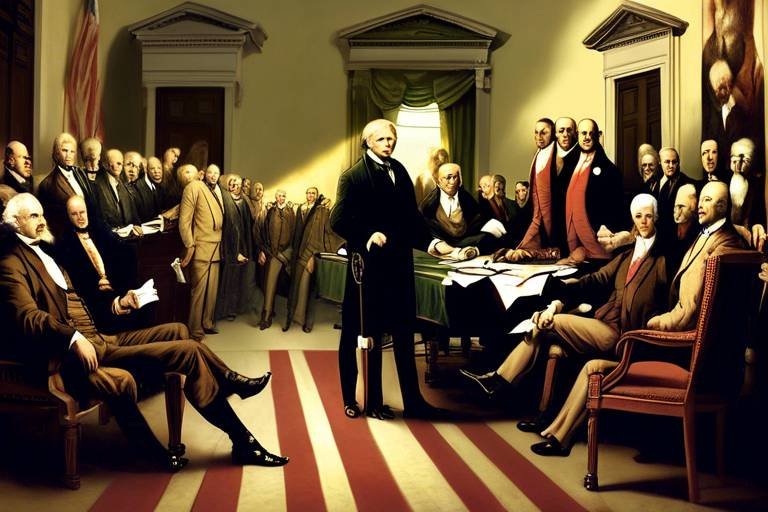Libertarianism: The Philosophy and Politics behind the Concept
Libertarianism is more than just a political ideology; it is a philosophical framework that champions individual freedom and autonomy. At its core, this philosophy argues that every person should have the right to make choices about their own life, provided they do not infringe upon the rights of others. In a world where government intervention often dictates the terms of our existence, libertarianism stands as a beacon for those who value personal responsibility and self-determination.
Imagine living in a society where your decisions—big or small—are dictated by a bureaucracy. Sounds stifling, right? Libertarianism seeks to flip this script by advocating for a limited government that exists primarily to protect individual rights rather than to control every aspect of life. This philosophy not only encourages individuals to take charge of their own destinies but also fosters a culture of innovation and entrepreneurship, as people are free to pursue their passions without excessive regulation.
The implications of libertarianism extend far beyond the individual. When a society embraces these principles, it can lead to a more dynamic economy and a more engaged citizenry. Think of it like a garden: when you allow plants to grow freely without constant pruning, they flourish in ways you never imagined. The same goes for people—when they are liberated from overbearing regulations, they often surprise us with their creativity and resilience.
However, libertarianism is not without its complexities. The balance between freedom and social responsibility is a delicate one. Critics often argue that a lack of government oversight can lead to inequality and exploitation. This brings us to a crucial question: can a society truly thrive on the principles of libertarianism without falling prey to the darker sides of human nature? This ongoing debate fuels discussions about the future of governance and the role of the state in our lives.
In the following sections, we will delve deeper into the historical roots of libertarianism, explore its core principles, and examine how these ideas manifest in real-world practices. By understanding this multifaceted philosophy, we can better appreciate its relevance in today’s political landscape and its potential to shape our future.
- What is libertarianism? - Libertarianism is a political and philosophical ideology that emphasizes individual liberty, personal responsibility, and minimal government intervention.
- What are the core principles of libertarianism? - The core principles include individual liberty, self-ownership, voluntary exchange, and limited government.
- How does libertarianism impact society? - Libertarianism can lead to greater personal freedoms and economic dynamism, but it also raises questions about social responsibility and inequality.
- What are some critiques of libertarianism? - Critics argue that libertarianism can lead to a lack of social safety nets and increased inequality, questioning the feasibility of its principles in practice.

Historical Roots of Libertarianism
Understanding the origins of libertarian thought provides essential context for its evolution and relevance today. The roots of libertarianism can be traced back to a rich tapestry of philosophical ideas and historical events that laid the groundwork for modern individualism and limited government. Key figures such as John Locke, Thomas Jefferson, and Friedrich Hayek have significantly influenced libertarian principles, advocating for personal freedom and the protection of individual rights.
In the 17th century, John Locke's theories on natural rights established a foundation for libertarian thought. He argued that individuals possess inherent rights to life, liberty, and property, which the government must protect. This revolutionary idea was pivotal in shaping the political landscape of the time, inspiring thinkers and revolutionaries alike. Locke's influence can be seen in the Declaration of Independence, where Thomas Jefferson echoed Locke's sentiments, emphasizing the importance of individual rights and the role of government as a protector of these rights.
Moving into the 19th century, the Industrial Revolution catalyzed a shift in societal views regarding government and economics. The rise of capitalism and the emphasis on free markets were championed by economists such as Adam Smith and later, Friedrich Hayek. Hayek's work in the mid-20th century, particularly his book The Road to Serfdom, warned against the dangers of government overreach and the erosion of individual freedoms. His arguments resonated with libertarians who believed that economic freedom is integral to personal liberty.
Throughout history, various movements and events have also contributed to the development of libertarianism. The American Revolution was a crucial turning point, as it not only sought independence from British rule but also underscored the importance of self-governance and individual rights. The Libertarian Party, founded in 1971, marked a formal political embodiment of these principles, advocating for a platform that emphasizes minimal government intervention in both personal and economic matters.
Moreover, the philosophical underpinnings of libertarianism have been shaped by a variety of thinkers across different eras. The Enlightenment period, with its focus on reason and individualism, fostered an environment where ideas about liberty and government could flourish. This intellectual backdrop allowed for the emergence of libertarian principles as a response to the growing power of the state.
In summary, the historical roots of libertarianism are deeply intertwined with the evolution of Western thought regarding individual rights and government roles. From the impactful writings of early philosophers to the political movements of the 20th century, libertarianism has emerged as a powerful philosophy advocating for personal freedom and minimal state interference. As we delve deeper into its core principles, we can appreciate how these historical influences continue to shape contemporary discussions about liberty and governance.

Core Principles of Libertarianism
Libertarianism is not just a political ideology; it's a way of viewing the world that revolves around the idea of **freedom**. At its core, libertarianism is built upon several fundamental principles that advocate for **individual liberty**, **personal responsibility**, and a **limited government**. These principles work together to form a coherent philosophy that challenges the conventional wisdom about the role of the state in our lives.
One of the most significant tenets of libertarianism is **individual liberty**. This principle emphasizes that every person has the right to make choices about their own life and property without interference from others, particularly the government. Think of it this way: just as a bird should be free to fly wherever it pleases, individuals should have the autonomy to navigate their lives according to their own preferences. This idea extends to various aspects of life, including personal relationships, career choices, and even lifestyle decisions.
At the heart of this philosophy lies the concept of **self-ownership**. Libertarians argue that individuals inherently own themselves, which means they have the right to control their own bodies and lives. This notion is not merely philosophical; it has profound implications for how we view issues such as consent, bodily autonomy, and personal choice. For instance, when discussing topics like drug use or marriage, libertarians advocate for minimal state intervention, believing that individuals should decide what is best for themselves.
Another critical aspect of individual liberty is **voluntary exchange**. Libertarians believe that all economic transactions should be consensual and free from government regulation. Imagine a marketplace where buyers and sellers engage in trade without any outside interference. This concept not only promotes economic freedom but also fosters innovation and competition, leading to a more dynamic and prosperous society. When individuals are free to make their own choices, they are more likely to pursue their passions, create value, and contribute to the economy.
Moving beyond individual liberty, we arrive at the principle of **limited government**. Libertarians argue that the primary role of government should be to protect individual rights, enforce contracts, and maintain public order. In essence, they believe that the government should act as a referee rather than a player in the game of life. This perspective raises important questions: What is the proper scope of government? How much authority should it have over our personal choices? By advocating for a minimal state, libertarians challenge the notion that government intervention is necessary to ensure social order or economic stability.
To illustrate the balance between individual liberty and government intervention, consider the following table:
| Aspect | Libertarian View | Conventional View |
|---|---|---|
| Individual Rights | Inherent and inviolable | Subject to regulation |
| Economic Transactions | Voluntary and consensual | Regulated by the state |
| Government Role | Minimal, protective | Active, interventionist |
This table highlights the fundamental differences between libertarian principles and more traditional views on governance. While many people may feel comfortable with a more involved government, libertarians argue that such an approach often leads to inefficiencies and infringements on personal freedoms.
In conclusion, the core principles of libertarianism—**individual liberty**, **self-ownership**, **voluntary exchange**, and **limited government**—form a cohesive framework that champions personal autonomy and minimal state intervention. As society grapples with complex issues ranging from economic policy to personal freedoms, these principles offer a compelling lens through which to evaluate the balance between freedom and responsibility.
- What is libertarianism? Libertarianism is a political philosophy that emphasizes individual liberty, personal responsibility, and limited government intervention.
- What are the core principles of libertarianism? The core principles include individual liberty, self-ownership, voluntary exchange, and limited government.
- How does libertarianism view government intervention? Libertarians argue for minimal government intervention, believing it should primarily protect individual rights and maintain public order.
- Can libertarianism coexist with social welfare programs? This is a contentious issue; many libertarians oppose extensive welfare programs, advocating instead for private charity and voluntary assistance.

Individual Liberty
At the heart of libertarianism lies the concept of , which emphasizes the importance of personal freedom and autonomy in making choices about one’s life and property. Imagine living in a world where your decisions about your body, your finances, and your relationships are entirely yours to make, free from the heavy hand of government interference. This idea resonates deeply with many, as it champions the notion that individuals are best suited to determine their own paths. The belief in individual liberty is not just a philosophical stance; it is a rallying cry for those who seek to live authentically and pursue their own happiness.
Libertarians argue that individual liberty is essential for a flourishing society. By allowing people to make their own choices, we foster an environment where creativity and innovation can thrive. Think about it: when people are free to pursue their passions without bureaucratic hurdles, they are more likely to contribute positively to the community. This is where the magic happens—when individuals take ownership of their decisions, they often find themselves more invested in the outcomes.
Moreover, the idea of self-ownership plays a crucial role in the libertarian framework. This principle asserts that individuals have the right to control their own bodies and lives without external coercion or interference. To put it simply, if you own yourself, you should have the freedom to make choices about your health, your education, and your career. This self-ownership extends to how we interact with others; voluntary exchange becomes the cornerstone of economic freedom. Libertarians argue that all transactions should be consensual and free from government regulation, as this fosters trust and respect in society.
However, the concept of individual liberty is not without its challenges. In a world where personal choices can have widespread implications, the question arises: how do we balance individual freedom with the need for social responsibility? This balance is crucial, as it ensures that while we cherish our freedoms, we also consider the well-being of our fellow citizens. The debate surrounding this balance often leads to discussions on the role of government in safeguarding individual rights while promoting a harmonious society.
In summary, individual liberty is a fundamental tenet of libertarianism that champions personal freedom and self-ownership. It is about empowering individuals to make their own choices, fostering an environment where creativity and innovation can flourish. Yet, as we navigate the complexities of modern society, the dialogue surrounding the balance between freedom and responsibility remains vital. By engaging in this conversation, we can explore the depths of what it means to be truly free while ensuring that our choices contribute positively to the world around us.
- What is individual liberty? Individual liberty refers to the freedom of individuals to make choices about their lives without interference from the government or other entities.
- Why is self-ownership important in libertarianism? Self-ownership is crucial because it asserts that individuals have the right to control their own bodies and lives, forming the basis for personal autonomy and responsibility.
- How does individual liberty impact society? Individual liberty promotes creativity and innovation, as people are free to pursue their interests and contribute positively to their communities.
- What are the challenges of individual liberty? Balancing individual freedom with social responsibility can be challenging, as personal choices may have broader implications for society.

Self-Ownership
At the core of libertarian philosophy is the profound concept of . This principle asserts that every individual has the inherent right to govern themselves and make choices about their own life and body. Imagine your life as a canvas; self-ownership empowers you to paint it however you desire, without interference from external forces. This notion is not merely about freedom; it’s about recognizing that you are the ultimate authority over your own existence.
Self-ownership is a radical departure from traditional views where external authorities—be it the government, society, or even family—often dictate what individuals can or cannot do. Libertarians argue that every person should be free to pursue their own happiness, as long as their actions do not infringe upon the rights of others. This leads to a society where personal responsibility flourishes. When individuals recognize that they own themselves, they are more likely to take responsibility for their actions, leading to a more conscientious and engaged citizenry.
Furthermore, self-ownership lays the groundwork for other essential libertarian principles such as voluntary exchange and individual liberty. For instance, when individuals own themselves, they are naturally inclined to engage in voluntary transactions with others, believing that these exchanges should be consensual and mutually beneficial. This perspective fosters an environment where innovation and creativity can thrive, as people feel free to explore their ideas and talents without the fear of excessive regulation or intervention.
To illustrate the importance of self-ownership, consider the following key aspects:
- Autonomy: Individuals have the right to make decisions about their own lives, including their health, education, and career choices.
- Accountability: With self-ownership comes the responsibility for one’s own actions, leading to a society where people are more likely to respect the rights of others.
- Personal Growth: When individuals are free to pursue their passions, they are more likely to develop their skills and contribute positively to society.
In conclusion, self-ownership is not just a philosophical ideal; it is a practical framework that encourages personal growth and societal progress. By embracing the concept of self-ownership, we can cultivate a culture that values individual rights and freedoms, ultimately leading to a more prosperous and harmonious society.
- What is self-ownership? Self-ownership is the principle that individuals have the right to control their own bodies and lives without interference from others.
- How does self-ownership relate to personal responsibility? Self-ownership encourages individuals to take responsibility for their actions, leading to a more accountable society.
- Can self-ownership coexist with government regulation? Libertarians argue that self-ownership is best supported in a system with minimal government intervention, allowing for maximum individual freedom.

Voluntary Exchange
At the core of libertarian economic philosophy lies the concept of , which champions the idea that all transactions should be consensual and free from government interference. Imagine walking into a bustling marketplace, where vendors and customers engage in lively negotiations, each party willingly entering into agreements that benefit them. This vibrant scene encapsulates the essence of voluntary exchange, where the freedom to buy, sell, and trade is not only a right but a fundamental principle that drives economic prosperity.
Voluntary exchange operates on the premise that individuals are best equipped to make decisions regarding their own lives and resources. When people engage in transactions, they do so based on their own preferences and needs, creating a dynamic environment where value is determined by mutual consent. This concept can be illustrated through a simple analogy: think of a dance where both partners must agree on the steps. If one partner tries to lead without the other's consent, the dance becomes chaotic and unenjoyable. Similarly, when government steps in to regulate or control exchanges, it disrupts the natural rhythm of the market.
One of the most compelling arguments for voluntary exchange is its ability to foster innovation and competition. In a system where individuals are free to negotiate terms, companies are incentivized to improve their products and services to attract consumers. This leads to a more diverse marketplace, where choices abound, and quality improves. For instance, consider the tech industry, which has thrived on voluntary exchange. Companies like Apple and Samsung continuously innovate to win over customers, resulting in cutting-edge technology and competitive pricing.
However, it’s essential to recognize that voluntary exchange is not without its complexities. While it promotes freedom, it also raises questions about equity and fairness. In a completely free market, disparities can arise, leading to scenarios where some individuals may exploit their advantages over others. This brings us to the critical balance that libertarians strive to maintain: ensuring that while the market remains free, it also provides a framework that protects individuals from coercion and fraud. In essence, the principles of voluntary exchange advocate for a system where:
- All parties enter into agreements willingly.
- Transactions are based on mutual benefit.
- Market forces determine prices and value.
In conclusion, voluntary exchange is a cornerstone of libertarian thought, embodying the belief that freedom in economic interactions leads to greater prosperity and innovation. By allowing individuals to make their own choices, we create a marketplace that thrives on creativity and competition, driving society forward. The challenge lies in ensuring that this freedom does not come at the expense of fairness, prompting ongoing discussions about the role of government in maintaining a just society.
- What is voluntary exchange? Voluntary exchange refers to the process where individuals freely engage in transactions without coercion, based on mutual consent and benefit.
- How does voluntary exchange benefit the economy? It fosters innovation, competition, and a diverse marketplace, leading to improved products and services.
- Are there any downsides to voluntary exchange? While it promotes freedom, it can also lead to disparities and potential exploitation if not balanced with protective measures.

Limited Government
At the core of libertarian thought lies the principle of , a concept that advocates for a state whose powers are strictly confined to protecting individual rights, enforcing contracts, and maintaining public order. Imagine a world where the government is like a referee in a sports game—necessary for ensuring fair play but not allowed to dictate how players should strategize or execute their game plans. This analogy encapsulates the libertarian vision: a government that intervenes only when absolutely necessary, allowing individuals the freedom to make their own choices.
Libertarians argue that the expansion of government powers often leads to a decrease in personal freedoms and autonomy. They believe that when governments overreach, they can stifle innovation, create dependency, and infringe on the rights of individuals. For instance, consider the impact of extensive regulations on small businesses. While regulations are intended to protect consumers, excessive bureaucratic oversight can hinder entrepreneurship, making it difficult for new businesses to thrive. In a truly libertarian society, these businesses would operate with minimal interference, fostering an environment ripe for innovation and growth.
Moreover, the libertarian perspective holds that government should not be involved in personal decisions such as healthcare, education, or lifestyle choices. This belief stems from the conviction that individuals are best equipped to make decisions about their own lives, free from government mandates. For example, in a libertarian framework, healthcare would be a matter of personal choice rather than a government obligation. This could potentially lead to a more competitive healthcare market, where individuals can select plans that best fit their needs without government-imposed restrictions.
However, the idea of limited government is not without its challenges. Critics often argue that a minimal state might struggle to address complex social issues such as poverty, education, and public health. They question whether a completely free market can adequately provide for those in need, leading to discussions about the balance between freedom and social responsibility. To illustrate, consider a scenario where a natural disaster strikes a community. Would a limited government be able to effectively coordinate rescue and recovery efforts without the extensive bureaucratic framework that often accompanies larger government structures? This debate highlights the need for a nuanced understanding of how limited government can function in practice.
Ultimately, the principle of limited government is about finding the right balance. It advocates for a political system that prioritizes individual freedoms while recognizing the need for some degree of governance to maintain order and protect rights. The challenge lies in defining the boundaries of that governance—ensuring it remains a facilitator of freedom rather than a hindrance. As we navigate the complexities of modern society, the question remains: can we achieve a system that honors the libertarian ideal of limited government while effectively addressing the challenges of our time?
- What is the main goal of limited government? The primary goal is to ensure that the government does not infringe on individual liberties and only intervenes when necessary to protect rights and maintain order.
- How does limited government affect economic growth? Proponents argue that by reducing regulations and allowing free market principles to flourish, limited government can stimulate economic growth and innovation.
- Are there any risks associated with limited government? Critics point out that while it promotes freedom, limited government might struggle to address social issues like poverty and public health without a robust framework for intervention.
- Can limited government coexist with social programs? Yes, many libertarians advocate for voluntary charity and community-based solutions as alternatives to government-run social programs.

Libertarianism in Practice
When we dive into the world of libertarianism in practice, it’s like peeking behind the curtain of a fascinating stage show. The principles of libertarianism, which advocate for individual freedom and minimal government intervention, are not just theoretical musings; they manifest in real-world policies that can either shine or stumble. You might wonder, how do these ideals translate into actionable governance? Let’s explore some significant examples and the challenges they face.
One shining example of libertarian principles in action can be observed in Switzerland. Known for its decentralized government structure, Swiss cantons enjoy a high degree of autonomy, allowing them to experiment with various policies that reflect libertarian ideals. For instance, the Swiss model promotes direct democracy, giving citizens the power to vote directly on legislation. This system not only fosters individual liberty but also encourages personal responsibility among citizens, as they are directly involved in decision-making processes that affect their lives.
In the United States, we can look at states like New Hampshire, which has embraced libertarian policies to a certain extent. The state’s motto, “Live Free or Die,” reflects a cultural commitment to personal freedom. New Hampshire has no sales tax and minimal regulations on businesses, creating an environment where entrepreneurship can flourish. This approach has drawn many libertarians and free-market enthusiasts to the state, creating a unique blend of community and individualism.
However, the implementation of libertarian principles is not without its challenges. Critics often point out the potential downsides of limited government. For instance, in areas where government intervention has been minimized, such as healthcare and education, the results can be mixed. Without regulatory oversight, issues like inequality and access to essential services can arise. This raises an important question: can a society truly thrive on the principles of libertarianism without sacrificing the welfare of its most vulnerable members?
To illustrate the complexities involved, let’s consider a few case studies:
| Case Study | Location | Outcome |
|---|---|---|
| Direct Democracy | Switzerland | High citizen engagement and satisfaction |
| Minimal Regulations | New Hampshire | Economic growth but concerns over social services |
| Drug Decriminalization | Portugal | Reduced drug-related crime and improved public health |
As we can see from the table, while some libertarian policies have led to positive outcomes, others have sparked debates about their long-term sustainability. For example, Portugal’s decriminalization of drugs is often hailed as a success, leading to lower rates of addiction and overdose deaths. Yet, it also raises questions about the balance between personal freedom and societal responsibility. Are we prepared to accept the consequences of individual choice when it comes to matters that affect public health?
In conclusion, the practice of libertarianism reveals a landscape filled with both opportunities and obstacles. As we analyze these real-world applications, it becomes clear that while the ideals of freedom and autonomy are appealing, the practical implications of such a philosophy demand careful consideration. How do we ensure that the rights of individuals are upheld while also addressing the needs of the community? This ongoing dialogue is essential for the evolution of libertarian thought in our fast-changing world.
- What is libertarianism? Libertarianism is a political philosophy that emphasizes individual liberty, personal responsibility, and minimal government intervention in both personal and economic affairs.
- How does libertarianism manifest in government policy? Libertarian principles can be seen in policies that promote personal freedom, such as direct democracy, minimal regulations, and voluntary exchange.
- What are the challenges of implementing libertarian policies? Challenges include potential inequalities, access to essential services, and the balance between individual freedom and social responsibility.
- Can libertarianism adapt to contemporary issues? Yes, the future of libertarianism will depend on its ability to address modern societal challenges while remaining true to its core principles.

Case Studies
When it comes to understanding the practical implications of libertarianism, examining real-world case studies can provide profound insights. These examples showcase how libertarian principles have been applied in various contexts, revealing both the successes and challenges that arise from implementing a minimal state approach. One prominent case is that of New Zealand in the 1980s, where the government underwent significant economic reforms aimed at reducing state intervention. The country shifted from a highly regulated economy to one that embraced free-market principles, leading to remarkable changes.
During this transformative period, New Zealand focused on deregulating industries, cutting taxes, and privatizing state-owned enterprises. The result? A surge in economic growth and efficiency. According to a report by the New Zealand Association of Economists, the country's GDP per capita increased significantly, demonstrating how reducing government interference can foster economic vitality. However, the transition wasn't without its challenges. Critics pointed out that while the economy thrived, social inequalities widened, raising questions about the balance between economic freedom and social responsibility.
Another compelling example can be found in the state of Colorado in the United States, particularly regarding its approach to cannabis legalization. In 2012, Colorado became one of the first states to legalize recreational marijuana, a move that aligned with libertarian principles of personal choice and voluntary exchange. The implementation of this policy resulted in a substantial increase in tax revenue, with the state collecting over $387 million in tax revenue from cannabis sales in 2020 alone. This case illustrates how allowing individuals to make their own choices can lead to economic benefits, while also raising questions about public health and safety regulations.
However, not all case studies are clear-cut successes. The implementation of libertarian principles in Chile during the Pinochet era serves as a cautionary tale. While the country adopted neoliberal policies that emphasized privatization and deregulation, the approach was marred by severe human rights violations and authoritarian governance. This example highlights the potential pitfalls of applying libertarian principles without a strong commitment to individual rights and democratic processes.
In conclusion, case studies like those from New Zealand, Colorado, and Chile provide a nuanced understanding of how libertarianism operates in practice. They reveal that while the philosophy can lead to economic growth and greater personal freedoms, it also raises critical questions about social equity and governance. As we continue to explore the implications of libertarianism, these case studies serve as vital touchpoints for discussions surrounding the balance between freedom, responsibility, and the role of government in society.
- What is libertarianism? Libertarianism is a political philosophy that emphasizes individual liberty, personal responsibility, and minimal government intervention in both personal and economic matters.
- How does libertarianism view government? Libertarians advocate for a limited government that primarily exists to protect individual rights, enforce contracts, and maintain public order, rather than intervening in personal choices.
- What are some criticisms of libertarianism? Critics argue that libertarianism may lead to social inequalities and that a lack of government intervention can harm vulnerable populations, raising concerns about the balance between freedom and social responsibility.
- Can libertarian principles be applied in contemporary politics? Yes, libertarian principles can be applied in various political contexts, and their effectiveness can be observed through real-world case studies.

Critiques and Challenges
While libertarianism champions the ideals of individual freedom and minimal government intervention, it is not without its fair share of critiques and challenges. Detractors often argue that a system based solely on personal liberty can lead to significant social inequalities and a lack of essential services for the most vulnerable members of society. Critics question whether a society can truly thrive when the government plays such a limited role, particularly in areas like education, healthcare, and infrastructure.
One significant critique revolves around the concept of social responsibility. Opponents of libertarianism argue that while individuals should have the right to make choices, those choices can sometimes have negative repercussions for the community. For instance, if a corporation is allowed to operate without regulation, it might prioritize profits over environmental sustainability, leading to detrimental outcomes for society as a whole. This raises the question: can we trust individuals and businesses to act in the best interest of the community without some form of oversight?
Another challenge is the potential for economic disparity. Libertarians advocate for a free market where competition thrives, but critics point out that without government intervention, wealth can become concentrated in the hands of a few. This concentration can stifle competition and innovation, ultimately harming the economy. A society that prioritizes freedom must also grapple with the reality that not everyone starts from the same place, and without a safety net, many may fall through the cracks.
Moreover, the concept of self-ownership is often debated. While the idea that individuals should control their bodies and lives is appealing, it can lead to ethical dilemmas. For example, if someone chooses to engage in harmful behaviors, should the government step in to protect them? This dilemma highlights the tension between personal freedom and societal welfare, prompting a reevaluation of how far individual rights should extend when they potentially harm others.
In summary, while libertarianism offers a compelling vision of freedom and autonomy, it must confront significant critiques regarding its feasibility in addressing social inequalities, economic disparities, and ethical dilemmas. The balance between liberty and social responsibility remains a contentious issue, calling for ongoing dialogue and exploration of how these principles can coexist in a practical governance framework.
- What is the main principle of libertarianism? Libertarianism primarily advocates for individual liberty and minimal government intervention in both personal and economic matters.
- How does libertarianism address social inequalities? Critics argue that libertarianism may exacerbate social inequalities due to its limited government role, which can lead to a lack of support for vulnerable populations.
- Can libertarianism coexist with social responsibility? This is a contentious issue; while libertarians emphasize personal choice, critics believe that some level of government intervention is necessary to ensure social welfare.
- What are the ethical implications of self-ownership? Self-ownership raises questions about the extent of personal freedom, especially when individual choices can lead to harm for oneself or others.

The Future of Libertarianism
The future of libertarianism is a topic that invites both enthusiasm and skepticism. As societal values evolve, the principles of libertarianism face the challenge of remaining relevant in a rapidly changing world. With every new technological advancement and shifting cultural norm, the core tenets of individual liberty and limited government must be examined and adjusted to meet contemporary issues. So, what does the future hold for this philosophy that champions personal freedom?
One of the most significant factors influencing the future of libertarianism is the rise of digital technologies. The internet has revolutionized how we communicate, transact, and interact with one another. This has led to a newfound emphasis on privacy and data ownership—issues that libertarians have been advocating for long before they became mainstream. The question arises: can libertarianism effectively adapt to these digital realities while still promoting the idea of self-ownership and voluntary exchange?
Moreover, as the global landscape becomes increasingly interconnected, libertarians must grapple with the implications of international trade and immigration. Many libertarians argue for open borders and free trade as mechanisms for enhancing individual freedom and prosperity. However, this stance often meets resistance from those who prioritize national security and social cohesion. Balancing these competing interests will be crucial for the future of libertarian policies.
Additionally, the ongoing debates surrounding social responsibility and government intervention in areas like healthcare, education, and environmental protection challenge libertarian ideals. Critics often argue that without a robust governmental framework, societal inequalities may widen, leading to a fragmented society. Thus, a pressing question emerges: how can libertarians advocate for minimal state intervention while addressing the needs of the most vulnerable populations?
In response to these challenges, some libertarians are exploring innovative solutions that blend traditional libertarian principles with modern realities. For instance, the emergence of decentralized finance (DeFi) offers a glimpse into how voluntary exchange can thrive in a digital economy, free from government oversight. Additionally, community-driven initiatives may serve as alternatives to government programs, showcasing how individuals can come together to solve social issues without state intervention.
As we look to the future, the adaptability of libertarianism will determine its relevance. Engaging with contemporary issues while remaining true to its foundational principles will be key. The movement must not only advocate for individual rights but also demonstrate a commitment to finding practical solutions that resonate with a broader audience. In doing so, libertarianism can continue to inspire and influence the political landscape.
- What is libertarianism? Libertarianism is a political philosophy that emphasizes individual liberty, personal responsibility, and minimal government intervention in both personal and economic affairs.
- How does libertarianism address social issues? Libertarians advocate for voluntary solutions and community-driven initiatives rather than government interventions to address social issues.
- Can libertarianism adapt to modern challenges? Yes, many libertarians are actively exploring ways to adapt their principles to contemporary issues, especially in technology and global interconnectedness.
- What role does government play in a libertarian society? In a libertarian society, the government's primary role is to protect individual rights, enforce contracts, and maintain public order, with minimal intervention in personal choices.
Frequently Asked Questions
- What is libertarianism?
Libertarianism is a political philosophy that emphasizes individual liberty, personal responsibility, and minimal government intervention in both personal and economic matters. It's all about allowing people the freedom to make their own choices, as long as they don't infringe on the rights of others.
- What are the core principles of libertarianism?
The core principles of libertarianism include individual liberty, self-ownership, and voluntary exchange. These principles advocate for a society where individuals have the freedom to control their own lives and engage in consensual transactions without government interference.
- How does libertarianism view government?
Libertarians believe in a limited government that exists primarily to protect individual rights, enforce contracts, and maintain public order. They argue that government should not interfere in personal choices or economic activities, as this can lead to a loss of freedom.
- Can you give examples of libertarian policies in practice?
Sure! Examples of libertarian policies include reducing taxes, deregulating industries, and privatizing public services. These policies aim to enhance individual freedoms and promote a free market economy, though they can also lead to debates about their effectiveness and social impact.
- What are some critiques of libertarianism?
Critics argue that libertarianism may lead to inequality and neglect of social responsibilities. They question whether a minimal government can adequately address issues like healthcare, education, and public safety, suggesting that some level of intervention may be necessary for a fair society.
- What is the future of libertarianism?
The future of libertarianism hinges on its ability to adapt to modern challenges while staying true to its foundational beliefs in liberty and individual rights. As society evolves, libertarians will need to address contemporary issues in a way that resonates with both their principles and the needs of the populace.



















